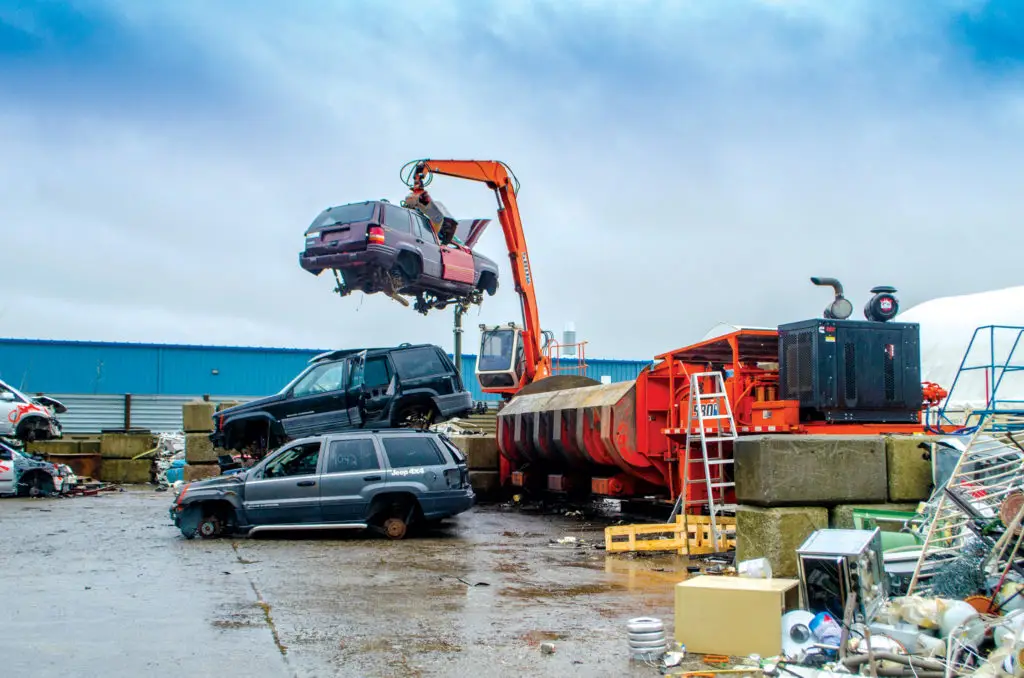by Sarah Bruce
Photos by Sarah Bruce
At least the ones that end up at Riteway Auto Recycling Ltd. and Pick a Part in Chilliwack, B.C. do.
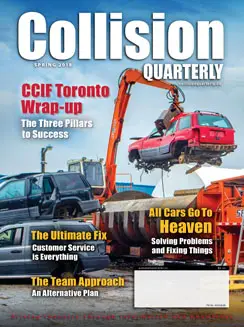
Riteway Auto Recycling, combined with Pick a Part and Pick a Part Metal Recycling, make up a unique system of start to finish recycling for end-of-life cars.
It all started with Riteway as a wholesale retail division for later model vehicles, which opened in 1984. Pick a Part, Riteway’s next-door neighbour, started in 1991 as a self-serve facility for older auto parts. The most recent addition, the Pick a Part Metal Recycling yard, opened in 2012 to complete the automotive cycle of life.
“From the road it’s kind of deceiving what’s behind the fences here and what we’ve done,” said Mike McCunnie, manager of all three facilities. “The best part is John Davy has owned everything here since day one. He’s always been hands-on. If we’re building a fence or designing anything, John is right here. This is his passion and what drove him.”
“The motto around here is we solve problems and we fix things.”
Davy and McCunnie work side by side to constantly improve what is more than just a job to them; it is a shared passion. “John and I are always in competition to improve the place,” McCunnie said with a laugh. Currently, Davy is enjoying some well-deserved vacation time while McCunnie holds down the fort, so he will be coming home to improvements. The same happens when McCunnie goes away.
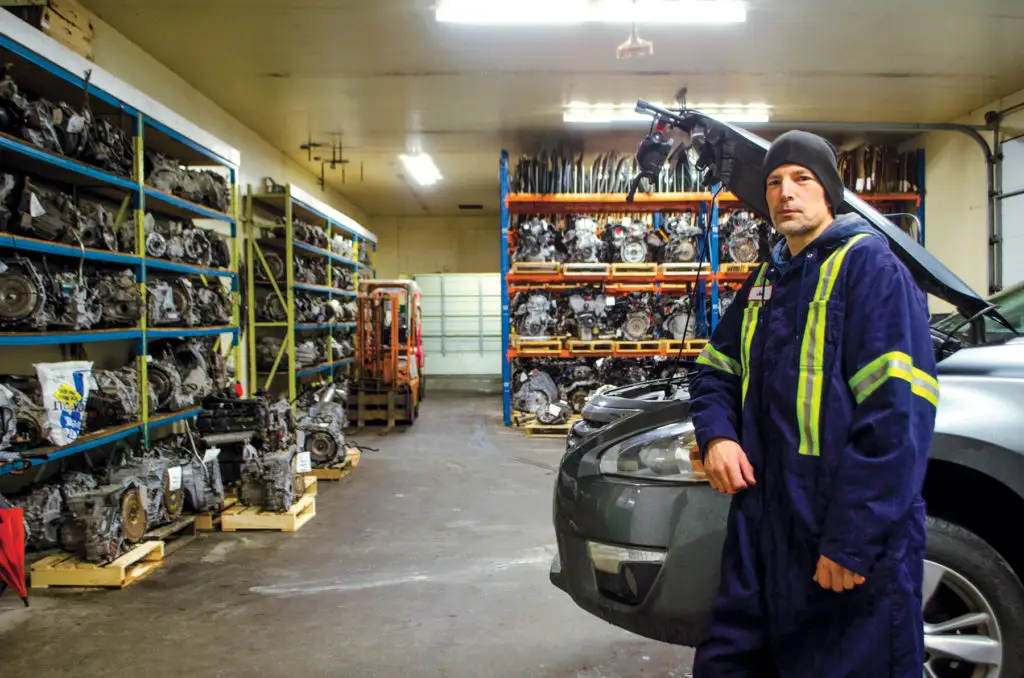
As manager of all three facilities, McCunnie has his daily work cut out for him, but he has a system. “Every day, I start off with Riteway, then wander over to Pick a Part, and then I hit the metal yard,” he explained. He makes sure to make contact with every single employee. “That way I don’t need managers and there is no second-hand information or delays. I can take care of stuff immediately. The motto around here is we solve problems and we fix things.”
“The staff who work in the Riteway office handle all ICBC and mechanical transactions for the shops,” McCunnie explained. “They create work orders and out of that we offer the same day or next day delivery [for used auto parts.] It’s what customers want.”
There are five dismantlers in the yard and three processing bays. On average a dismantler can dismantle about two cars a day. Everyone takes pride in having a clean working environment and as a result work areas are immaculate with no signs of oil stains or any other contaminants on the ground. All the roads in the yards are paved and bobcat brush-attachments sweep up debris, nuts and bolts every other day.
“We are always caught up or ahead. In today’s business that’s just the way you’ve got to be.”
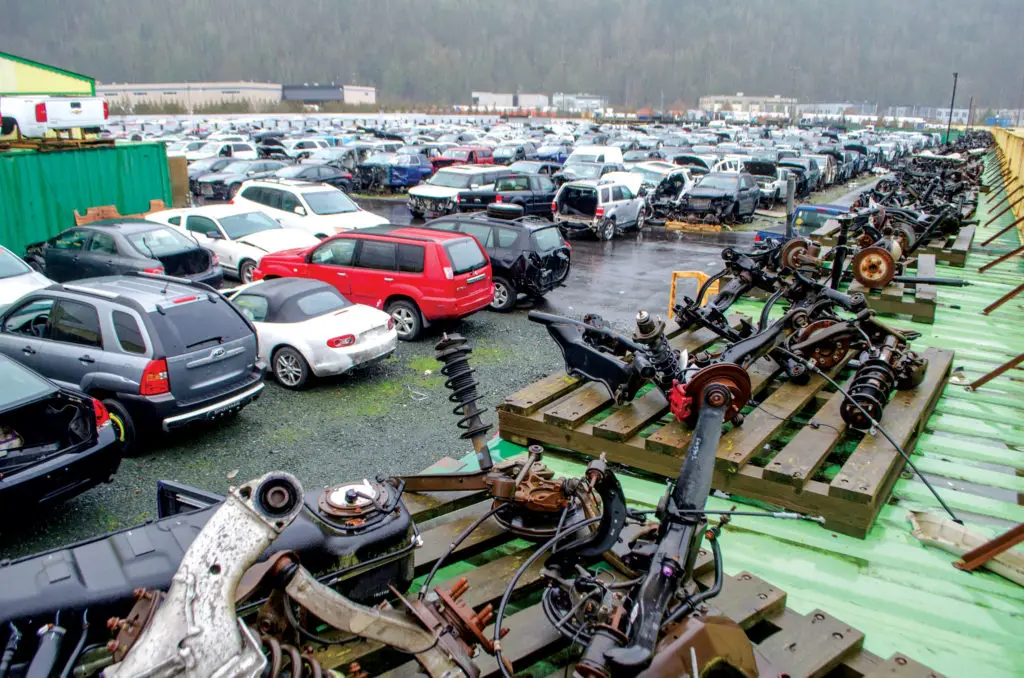
Once the vehicles are dismantled, all motors, transmissions and computerized parts are tested, labelled, organized and stored. Every vehicle and every part is added to a computerized inventory.
“We ship parts Canada wide,” McCunnie said. “We designed our own crates so parts arrive without damage. Whether it’s a shop in Prince George, Alberta or Quebec, everything gets there in one piece. It’s all about attention to detail.”
Pick a Part has a similar purpose, but with one big difference; it is entirely self-serve, McCunnie explained. “Vehicles come in and are assigned a number for inventory. Pictures are taken of the vehicle so it can be posted on the website. They are taken and put on the drain rack where all fluids are drained for reuse or recycling. Then the wheels and tires are removed.”
The batteries are detached and tested. If they are still usable they are sold. If not, they are recycled. All gas, anti-freeze and window washer fluids are drained, tested and, if possible, reused. All contaminants are properly disposed of, McCunnie explained. “So you have a hundred percent clean vehicle that ends up in the yard.”
“We have 1300 plus cars, with fresh stock coming in daily,” McCunnie said. “Everything is drained, sorted then placed on stands for access for customers. It’s totally self-serve. [Customers] bring their own tools and save money. When they walk in the door and request a part, we look up the interchange form and attach the interchange to the vehicle and the vehicle is located so they know right where they’re headed. They’ve done their research, looked it up online, and have seen pictures of the vehicle. It doesn’t get any simpler than that.
“When you use a recycled part, you are getting OEM quality at a fraction of the cost.”
“We have a solid customer base that has been coming here for years. Chances are, if you need a part, we’ve got it. If we don’t, you can put in a request and when I purchase a vehicle or a vehicle comes in, we notify you.”
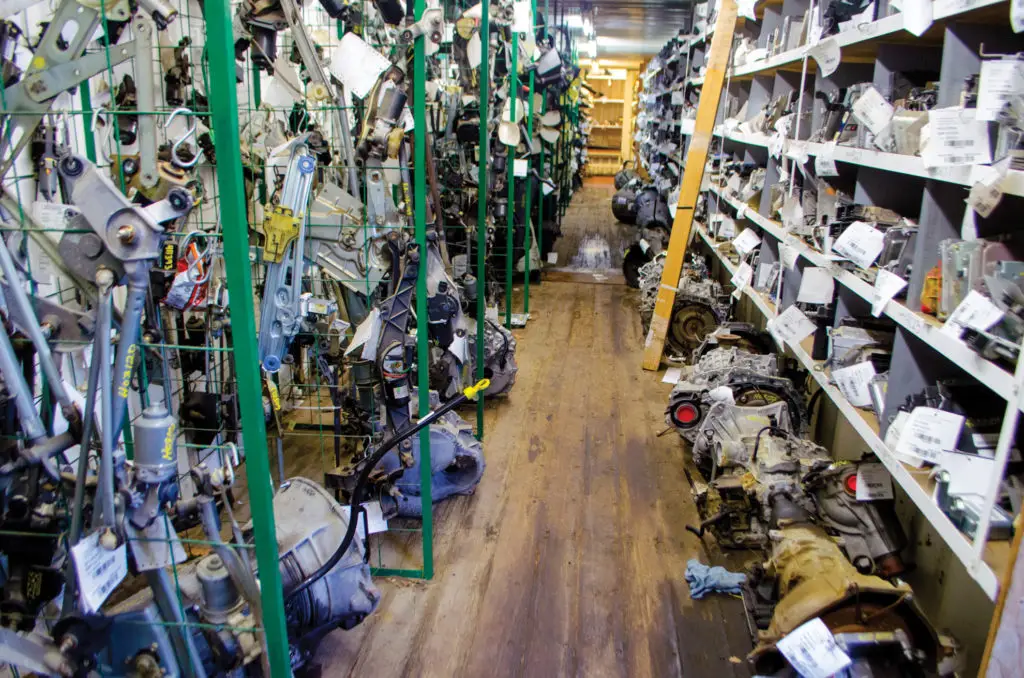
Every couple of months, if a car has been thoroughly picked over, or a new, more complete model comes in, the car is deemed an end-of-life vehicle and transferred to the metal scrap yard.
“The main gist of this [metal scrap] yard is just a nice place to sell your scrap,” McCunnie said, showing off the three-acre addition to the Riteway-Pick a Part family.
“Five years ago, John and I were in the auto recycling business and we were on the top of our game. So John, not yet ready to retire, comes up to me and says, ‘Hey, I have an idea, let’s open a scrapyard.’ I said, ‘Hey, let’s not do that. I get cars, I don’t get this,’” McCunnie said, laughing. But, inspired by Davy’s ambition, he got a quick lesson in “scrapology” when the “awesome guys” who buy their scrap, came and walked them through the entire process of identifying metals.
“Everything that comes in here is handled efficiently and right away. It gets sorted and processed. Everything has to have a place to go and a reason for why you are moving it. We are never behind. We are always caught up or ahead. In today’s business that’s just the way you’ve got to be.”
They recycle about 3800 cars a year from start to finish. Using an Al-jon baler, they cube the end-of-life vehicles so they are easy to stack and save space. The whole operation sits on top of a cement pad with filtration and drainage built in so no contaminates escape.
The yard is built in a horseshoe shape for convenience. Customers drive vehicles in and up onto a scale to be weighed, then they are directed to the appropriate area to scrap their metal. Back on the scale they are reweighed and issued a ticket that is used in a machine at the scale shack for cash payment.
“If you look at a vehicle,” McCunnie said. “You can get about an average of 60 percent recycled out of it. I’d like to see that average higher. [At least most] body shops don’t have a problem using reused auto parts.”
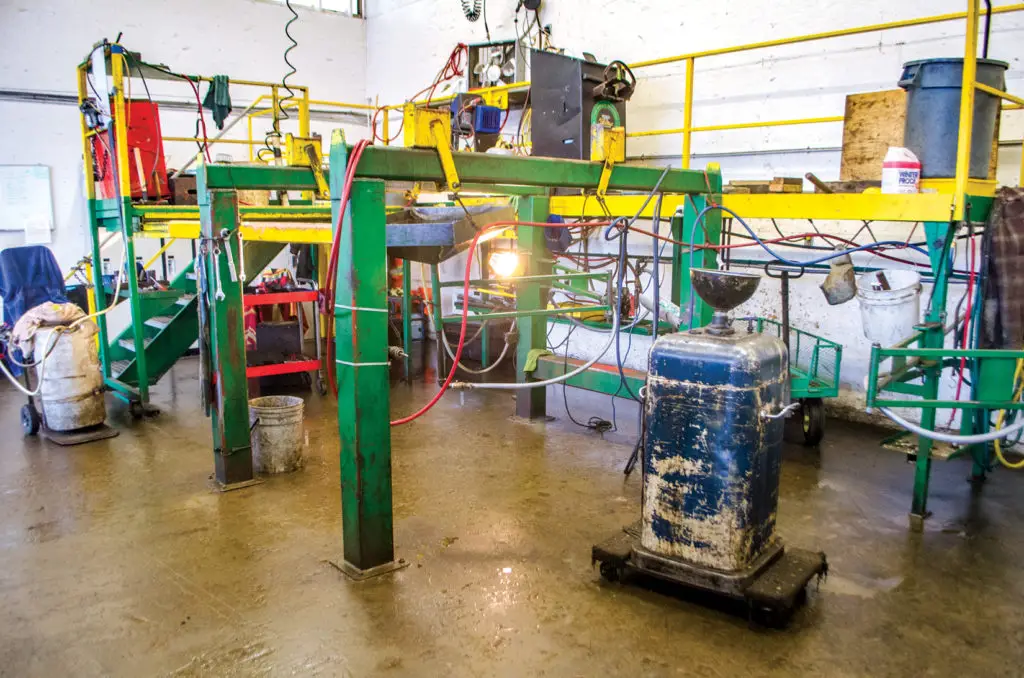
But ICBC does. They are often criticized for not utilizing recycled parts enough.
“It’s different in other provinces and the United States also,” McCunnie explained, feeling that ICBC does not support the auto-recycling industry as well as it could. “When you are selling used auto parts it has to be an OEM part. If this car has after market parts on it,” pointing to a Nissan that was prepped for dismantling, “I can’t resell them to an ICBC claim. But when you use a recycled part, you are getting OEM quality at a fraction of the cost. If you can economically fix a vehicle, you can keep it on the road instead of just writing it off because when there are only new parts available you can’t fix it.”
Riteway Auto Recycling, along with the Automotive Retailers Association (ARA), currently advocates for an increase in the use of recycled parts.
“All our parts are inspected the best we can and that’s where the ARA accredited recycling program comes in,” McCunnie said, explaining the importance of providing shops with quality used parts. “With the ongoing training for identifying damage, we aren’t wasting shop’s time.”
“Everyone takes pride in having a clean working environment and as a result work areas are immaculate with no signs of oil stains or any other contaminants on the ground.”
“I love the ARA accreditation. It provides ongoing training for all our guys. And it opened up conversation about how to do things better and make improvements. It installed a level of professionalism [and includes] a pretty slick training program.”

